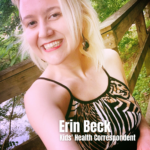by Erin Beck, Kids’ Health Coordinator
In a series of recent posts on the child mental health crisis in West Virginia, I wrote about how children in West Virginia are ending up in crises in hospital emergency rooms with nowhere to send them. I also wrote about how aspects of the pandemic, including loss of structure and an increase in instability, as well as political and social disagreements among families, are contributing to the problem. Mental health providers told me they lacked enough resources and providers to meet the need. That’s despite a 2019 memorandum of understanding the state reached with the Department of Justice, requiring state officials to expand the types of services meant to prevent the need for more intensive services like residential care. The state Department of Health and Human Resources responded Wednesday, saying they have met the criteria they agreed to.
“West Virginia has expanded access and availability of in-home and community-based behavioral health services for children and youths in recent years,” said Allison Adler, DHHR spokeswoman. “All of the services mentioned in the memorandum of understanding between the Department of Justice and West Virginia have been implemented. We continue to work with our partners at the Department of Justice to fulfill the terms of the memorandum.”
I’ll post the rest of the response below from Adler below. She described the components mentioned as “examples.”
“The WV Bureau for Behavioral Health (BBH) Office of Children, Youth, and Families has increased federal and state funding for children’s behavioral health services in recent years. (Highlights of BBH children’s services are available at https://dhhr.wv.gov/BBH/about/Children,YouthandFamilies/Pages/default.aspx.)
Services comprising the state’s system of care include these:
- Statewide 24/7 Children’s Crisis and Referral Line. Launched officially with a press release in December 2021, the Children’s Crisis and Referral Line can interrupt behavioral health crises by connecting families with behavioral health services in their communities. The option to call, text, or chat is available 24 hours a day, seven days a week at 844-HELP4WV or 844-435-7498 (call or text) or by chat at https://www.help4wv.com/ccl. In crisis situations, the helpline links families with regional mobile crisis response and stabilization teams who can help de-escalate by phone or respond in person if the family chooses.
- Regional 24/7 Mobile Crisis Response and Stabilization Teams linked through the Children’s Crisis and Referral Line (844-HELP4WV or 844-435-7498). From a pilot project serving a few counties in 2016, Children’s Mobile Crisis Response and Stabilization Services are now available statewide through six regional behavioral health agencies. After BBH received state improvement funding for expansion, BBH posted an announcement of funding availability (AFA 03-2019) to serve all regions/counties in the state in May 2019, but there were no applicants in the northern or eastern panhandles. After a second AFA in December 2019 (AFA 08-2020), BBH secured a provider for the eastern panhandle in fall 2020, so the remaining eight counties in the eastern panhandle gained services in 2021 through a seventh provider for full statewide coverage. The providers are as follows:
Region 1—Genesis Youth Crisis Center
Region 2—WVU Healthcare Physicians
Region 3—Westbrook Health Services
Region 4—United Summit Center and Appalachian Community Health Center
Region 5—Prestera Center
Region 6—FMRS Health Systems
- Wraparound services. Like Children’s Mobile Crisis Response, the BBH Children’s Mental Health Wraparound program started as a pilot in 2016 that expanded with state improvement funding to cover the whole state through a competitive AFA (AFA 04-09). The providers are as follows:
Region 1—Braley & Thompson
Region 2—Board of Child Care
Region 3—National Youth Advocate Program
Region 4—Braley & Thompson
Region 5—Prestera Center
Region 6—FMRS Health Systems
- Children’s Mental Health Wraparound Services are being integrated into West Virginia Wraparound Services, which include the newer Children with Serious Emotional Disorder (CSED) Waiver of the Bureau for Medical Services (BMS) and Safe at Home WV program of the Bureau for Social Services (BSS). WV Wraparound is a key component of the state’s child welfare reform and agreement with the U.S. Department of Justice (DOJ). Find more information at https://childwelfare.wv.gov/Pages/default.aspx.
- Expanded School Mental Health. BBH funds Expanded School Mental Health (ESMH) services in 56 schools statewide with a current announcement of funding availability, AFA 02-2022, for up to 20 more sites depending on applicants. BBH also collaborates with the West Virginia Department of Education on its two federal Project AWARE grants that fund 18 additional ESMH sites for a total of 74 existing ESMH sites in the state. Expanded School Mental Health is a comprehensive system of behavioral health services and programs that builds on core services provided by schools. ESMH includes the full continuum of prevention, early intervention, treatment, and recovery. Prevention strategies work by either increasing protective factors (e.g., resiliency, social involvement, recognition of positive behavior) or decreasing risk factors (e.g., preventing early initiation of substance use, rebelliousness, low socioeconomic status). The ESMH model emphasizes shared responsibility and funding, services for all students, meaningful involvement of parents, guardians, care providers, and youth, evidence-based programs, and continuous quality improvement. ESMH provides three tiers of services/support to students within the school. Tier 1 provides universal prevention programs to all students and offers school-wide academic assessments and primary prevention programs related to suicide prevention, substance use prevention, anti-bullying, coping skills, resiliency, study skills and other academic builders. Tier 2 embraces higher at-risk students and includes referral services as identified, rapid response capability, study groups, tutoring, mentoring, after-school programs, small group interventions to address anger, social skills, substance use and other needs as well as individual supportive needs. Tier 3 is intended for students who have more needs and require intensive individual interventions such as counseling. Read more about ESMH at https://wvesmh.org/.
- Regional Youth Service Centers. Regional Youth Services Centers (RYSCs) are a statewide network that serves youths, families, and communities through outreach, engagement, and outpatient behavioral health services. The six RYSCs strive to strengthen community resource awareness and promote positive youth and family outcomes through coordinated services utilizing evidence-based programs and practices. The RYSCs include youth suicide intervention specialists, family coordinators, and first episode psychosis (FEP) services called Quiet Minds WV. Read more about RYSCs here.
- Substance Use Prevention Professionals. BBH funds regional and community substance use prevention services for all ages through six regional prevention lead organizations (PLOs) with extensive training and experience related to prevention and provide services such as information dissemination, education, alternatives, problem identification and referral, community-based processes, and environmental strategies. They are trained in the Strategic Prevention Framework (SPF) and have experience using data to guide prevention decisions—from identifying which substance use problems to address in a community, to choosing the most appropriate ways to address these problems, to determining whether selected interventions and strategies are making progress in meeting prevention needs. Find more information at https://helpandhopewv.org/prevention-in-your-region.html.
- Positive Behavior Support. BBH is expanding its capacity and developing its workforce through Positive Behavior Support (PBS) Services. In addition to funding PBS services and training through the WVU Center for Excellence in Disability (http://pbs.cedwvu.org/), BBH is working with Concord University to develop PBS Curriculum and Credentialing Training to build workforce capacity. PBS services focus on providing prevention and intervention supports for individuals who are demonstrating significant maladaptive behaviors, are at risk of out-of-home placement or involuntary commitment at a psychiatric hospital or psychiatric residential treatment facility (PRTF), or are ready to return to the community from an out-of-home placement. The new credentialing and certification process will allow WV to increase the ability of behavioral agencies to bill Medicaid for PBS services.
- Onboarding— Regional Youth Transition Navigators. Regional Youth Transition Navigators are one of the newer services BBH funds through the WVU Center for Excellence in Disability. Four of the six navigators are on board. This program aims to connect youths and young adults aged 14-25 with serious emotional disorder (SED), serious mental illness (SMI), or co-occurring disorders with needed services and supports to develop independent living skills, create and cultivate natural supports, navigate various systems, access and participate in treatment and recovery services, and thrive in all eight dimensions of wellness.
In addition to children-specific services, BBH continues to explore behavioral workforce capacity improvements through funding for programs, incentives for students (Statewide Therapist Loan Repayment program or STLR), and a new Behavioral Health Workforce and Health Equity Training Center at Marshall University (https://wvbhtraining.org/).”
Read previous posts in the series:
COVID-19 caused more chaos for struggling WV children
Vaccines, civil rights, misinformation: political problems harming kids’ health, too
WV kids in crises ending up at ERs with nowhere to treat them
With demand among children increasing, Manchin comes out against bill with funding for mental health
Mental health problems are treatable. If you’re in crisis, get immediate help: Call the National Suicide Prevention Lifeline at 1-800-273- 8255, chat with trained counselors 24/7, or get help in other ways through the Lifeline.




0 Comments